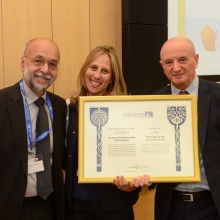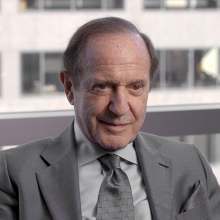Sandor Frankel of the Helmsley Trust
Q&A

I’m just a guy from the Bronx,” says the lead trustee of the Helmsley Charitable Trust’s Israel Program, who, with his co-trustees, gives away multimillions to Israel every year in his “dream job.”
Sandor (Sandy) Frankel, 71, is one of four trustees of The Leona M. and Harry B. Helmsley Charitable Trust, personally overseeing its Israel and Crohn’s/ Inflammatory Bowel Disease programs. He is a practicing attorney who represented Leona Helmsley, the hotel owner and real estate magnate from New York, for 18 years before her death in 2007. She established the Trust during her lifetime, and directed that, upon her death, her entire estate be liquidated and the proceeds contributed to the Trust. She gave her trustees full discretion as to the charitable uses of the funds, which currently total well over $5 billion—in addition to the more than $1.5 billion in grants already awarded. The four trustees—two of Mrs. Helmsley’s grandsons, a former business associate of hers, and Mr. Frankel—work together to choose the beneficiaries of funding for exceptional non-profits around the world.
In addition to the Israel and inflammatory bowel disease program areas, the Helmsley Trust gives to a wide variety of beneficiary organizations and institutions, in the fields of education, diabetes, rural healthcare, children-at-risk, and beyond. Under Mr. Frankel’s leadership, Israel has become a major beneficiary, with dozens of entities receiving major funding. The Trust’s relationship with the Weizmann Institute began in 2010, and has provided transformational funding for research related to Crohn’s disease, stem cells, and alternative energy sources totaling $23.1 million for six grants. Mr. Frankel sat down with Weizmann Magazine to talk about the Trust’s commitment to Israel and its gifts to the Weizmann Institute.
Q Why does the Trust give so widely to Israel?
A Although Mrs. Helmsley, who was Jewish, didn’t give to Israel during her lifetime, I think she would be pleased to know that her money is being wisely spent there. We have given a total of $151 million to Israel so far, because the opportunities for making an impact in Israel are so great. Not because Israel is ‘needy’ but because there is so much important work going on there, which more funding could simply take to the next level.
The four trustees have diverse philanthropic interests, though none of us had experience in philanthropy beforehand. I spent my career as an attorney and enjoyed my work, but this job is truly a dream. Sometimes I need to pinch myself because I’m in a position to help the Trust give away money and to do real good in areas that I care about.
When it comes down to it, I’m just a guy from the Bronx who cares about Israel as the homeland of the Jewish people. My wife is a sabra. Israel is a bastion of democracy in a troubled region of the world—a modern-day miracle that continues to flourish despite all odds. I truly believe that the development and security of Israel leads to the development and security of the world. And so investing in Israeli science and technology is a privilege and an opportunity to be part of this fantastic and important story.
Q Why Weizmann?
A Grants to the Weizmann Institute are a pretty good bet. You know you are investing in the best brains in the world. We know the funds are being used productively, they are responsibly spent, and that we’ll see real results in science. The research collaboration between the Weizmann Institute and the Technion in alternative energy set a high bar. But we know that basic research takes time and effort to bear results.
Q Why did you choose alternative energy research as one of your early philanthropic gifts?
A It was the choice of the Technion and Weizmann Institute, which have powerful teams in this area, in solar conversion and biofuel. We liked the idea that the strengths of each institution can be fused so that real progress can be made in this field. But ultimately what we invested in here were great minds. We don’t write checks to test tubes.
Q What other investments in Israel are you proud of?
A There are many! But just for a taste: We recently funded the creation of the Jerusalem Press Club in a state-of-the-art facility in Yemin Moshe overlooking the Old City. We wanted a comfortable and suitable place for journalists to convene for press conferences and meetings, so they can learn about what Israel is, and accurately report on Israel. We have given to many medical centers, Taglit-Birthright, and are supporting the construction of a secure national blood bank for Magen David Adom.
I don’t know what other country in the world has so many worthy causes and can generate so much excitement among philanthropists.
Q What is your vision for Helmsley’s Israel Program?
A My vision is that the program will only grow in years and decades to come, and that the world will reap the benefits. We will never run out of good ideas that are worth investing in in Israel.
Helmsley Charitable Trust grants to the Weizmann
Institute
Inflammatory Bowel Diseases and Crohn’s
The Helmsley Charitable Trust funded a three-year research grant, followed by a two-year research grant, for research on inflammatory bowel diseases. Inflammatory bowel diseases are a diverse group of chronic disorders affecting the human gastrointestinal tract and related organs. Several million people worldwide suffer from these disorders, which include Crohn’s disease and ulcerative colitis. Twelve research groups led by Prof. Benny Geiger of the Department of Molecular Cell Biology embarked on a wide range of interdisciplinary studies designed to present new perspectives and spark innovation in the field. Helmsley Trust support has helped Weizmann Institute researchers form new collaborations with clinicians, initiate joint studies with industry, and publish dozens of research papers in top journals describing new finds. These developments have placed the Weizmann Institute at the cutting edge of international research in Crohn’s and inflammatory bowel diseases. Prof. Geiger and Dr. Eran Elinav of the Department of Immunology are now developing unique and clinically relevant IBD models.
A major grant helped equip a new laboratory for the study of immunology and inflammation: the lab of Dr. Elinav. With an MD in internal medicine and a PhD from the Weizmann Institute in 2009, Dr. Elinav has brought extensive clinical experience to the bench and is making key advances in the understanding of IBD, metabolism, and metabolic disorders. His Personal Nutrition Project, which he is undertaking with Prof. Eran Segal of the departments of Molecular Cell Biology; and of Computer Science and Applied Math, is revealing intriguing insights about individuals’ specific responses to food, with implications for weight control and disease prevention.
Stem Cell Research
A multi-million-dollar “Tapping the Regenerative Power of Stem Cells” research program funded by the Trust helped launch Dr. Jacob Hanna of the Department of Molecular Genetics, an MD/PhD and a world leader in stem cell research, and support a broad coalition of stem cell researchers. Funds supported equipment in his lab. Over the three years of Helmsley support in this field, Weizmann Institute scientists discovered a number of checkpoints in the process of reprogramming adult cells into induced pluripotent stem cells. The most dramatic finding demonstrated that removing a single protein from adult cells lifted a major roadblock to the efficient production of stem cells—enabling nearly 100 percent of the cells to complete the reprogramming process in about eight days, compared to previous success rates of about 1 percent achieved over the course of several weeks.
They generated the first “humanized” mouse models containing humanderived tissues and developed more than 30 genetically modified animal models for stem cell study. Scientists also demonstrated the potential for cell therapy using human mesenchymal stem/stromal cells, as well as refining the use of cell reprogramming to reduce rejection in bone marrow and other transplanted tissues.
Energy Research
With another transformational grant, the Helmsley Charitable Trust seeded a threeyear collaboration between the Weizmann Institute of Science and the Technion-Israel Institute of Technology on energy research. Called “New Options for Solar Energy Conversion to Biofuel and Electricity,” the research program aimed to improve performance of solar cells and solar-driven biofuel production and find new sources for biofuel crops that would not compete with existing food production. Projects included basic research and engineering of advanced optics to improve solar light harvesting and quantum solar energy conversion. The project, unprecedented in scope in this field in Israel, produced research advances in a new class of solar cells; substantial progress in alternative biofuel sources and methods for turning algae and plant wastes into fuel; and improvements in the efficiency of solar cells.
Magnetic Reaonance Research
Another multi-million-dollar grant, over two years, funded a project entitled “Increasing the Power of Magnetic Resonance,” centered around research led by Prof. Lucio Frydman of the Department of Chemical Physics. This includes partial funding for purchasing one of the most powerful MR instruments in Israel. The Weizmann Institute has since recruited several new young scientists whose research requires the use of MR—individuals who might otherwise have opted for positions at other institutions. The Institute is rapidly expanding its capabilities in this area, which is poised to affect numerous areas of life sciences and materials science.








